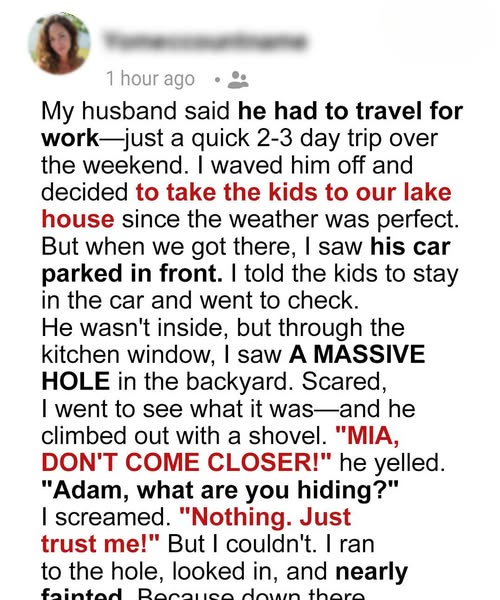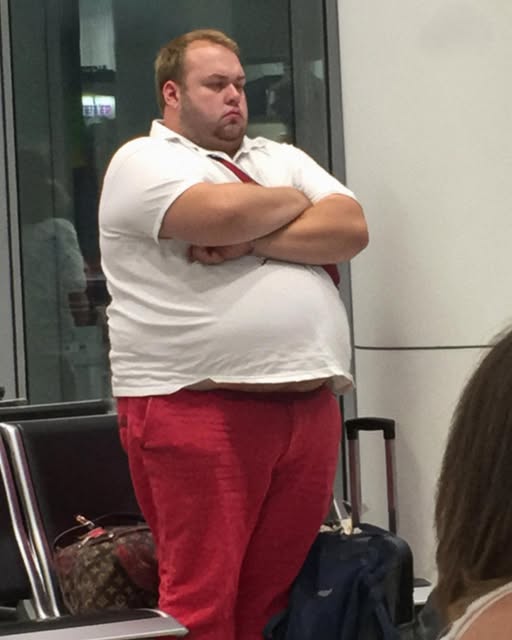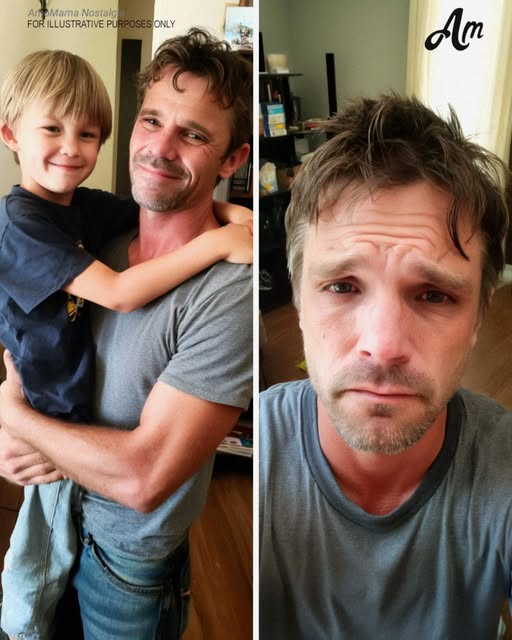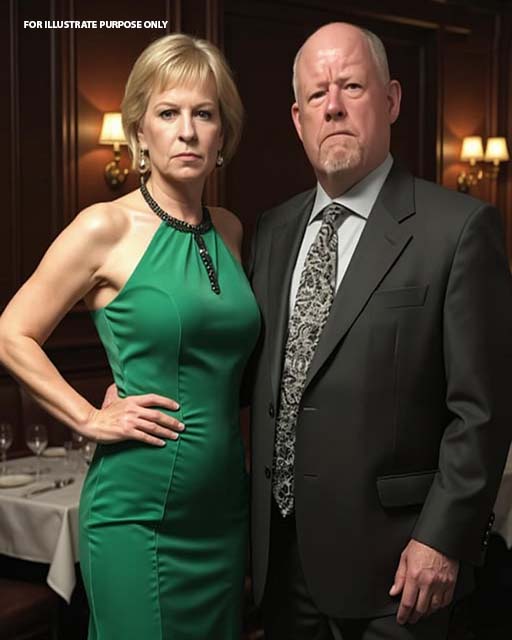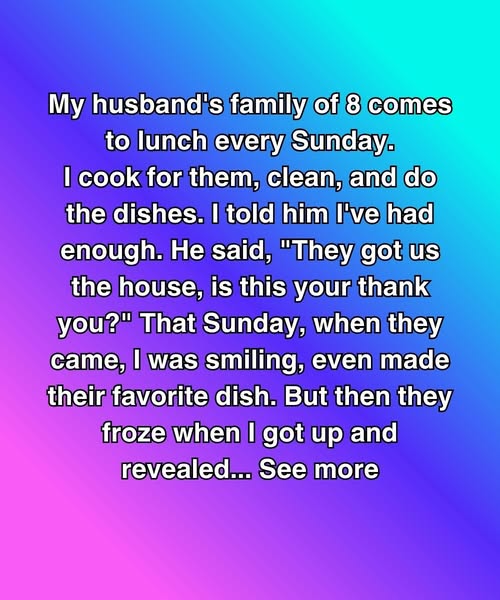He told me it was a quick work trip—two, maybe three days over the weekend. I kissed him goodbye, packed the kids’ swimsuits and the sticky bag of s’mores stuff, and drove to the lake house because the forecast promised those soft blue days you can’t waste.
His car was already there.
I told the kids to stay buckled, put on the voice that means business, and walked to the porch trying to convince myself there was an explanation that didn’t make my stomach drop. The front door was unlocked. Inside was quiet. No music, no TV, no shoes kicked off by the mat. Then I glanced through the kitchen window and saw the backyard swallowed by a crater the size of a kiddie pool.
I didn’t think. I went. The grass ended, the earth turned raw, the smell of wet soil hit, and a man—my husband—climbed out of the hole with a shovel over his shoulder like a guilty pirate.
“MIA, DON’T COME CLOSER!”
“What are you hiding?” My voice cracked. It sounded like someone else’s.
“Nothing. Just—please—trust me.”
Trust is funny. It lives in your bones until it doesn’t. I ran around him to the edge and looked down.
A safe. Old as a secret and twice as heavy. Rust flaking like fish scales. Half-buried, lips of metal washing up from the dirt. He’d been digging for hours—shirt plastered to him, mud on his jeans, eyes frantic and bright.
“What the hell is this?” I whispered.
“It’s not what it looks like.”
“You’re supposed to be in Omaha, not… doing a bad impression of a heist movie in our backyard.”
He braced his hands on his knees, gulping air, like honesty might be hiding in his lungs. “It belonged to my grandfather. He used to talk about money buried by the lake. I thought it was nonsense, but I found a journal in my dad’s boxes last month. There was a map, Mia. A real one.”
“So you lied. Ditched your family to go treasure hunting.”
“Not treasure—” he started, then stopped at my face. “I wanted to surprise you.”
“As what, exactly? A Christmas gift? ‘Surprise, honey, I disappeared and dug up a criminal starter kit’?”
He didn’t answer, and I didn’t ask again. I drove the kids to the diner off Route 8, let them split a chocolate milkshake and call it lunch, and told them Daddy was cleaning up something gross at the house. My hands shook so badly around my coffee I had to hold it with both.
When we came back, the safe sat on the grass like a stubborn whale beached by time. Adam had dragged a lawn chair out, a beer sweating in one hand, a crowbar in the other, chest bare and mottled with dirt. He looked wrecked and weirdly proud.
“You came back,” he said, almost relieved.
“Our kids want s’mores,” I said, because it was easier than saying I can’t feel my feet. “And I have questions.”
He nudged the safe with his boot. “Help me open it?”
“I hope whatever’s in there explains why my husband turned into a Saturday-morning cartoon villain.”
It took an hour and every curse word we own. WD-40 hissed. Metal groaned. The lid fought like it believed in itself. Finally, the hinges surrendered with a sound like old bones cracking, and we leaned in, twin beams of phone flashlights cutting through the dust.
Bundles of cash, rubber-banded and smug. Velvet pouches slumped like sleeping animals. Black-and-white photos curled at the edges. A note folded into neat thirds, the paper foxed and delicate.
Adam’s hands shook when he unfolded it. His mouth fell open the way it did when he realized the kids had painted the dog.
He passed me the letter. It was his grandfather’s handwriting—blocky and stubborn.
I did things I ain’t proud of. If you’re reading this, I’m gone. This money came at a price. Don’t use it unless you’re desperate. Some people might still come looking.
“Adam,” I said, and my own voice was steady in a way I didn’t feel. “What did your grandpa do?”
He looked suddenly twelve. “He worked for a guy back in the ’70s. Everybody whispered ‘connections’ and nobody said the word. He hinted he stashed… things. I didn’t think it would be—this.”
I stepped back like the safe had spit. The air felt wrong around it. “Did you know?”
“I suspected.” He swallowed. “Not like this.”
“And you brought our kids here?”
“I thought I could dig it up, take it to a bank, pretend it was—” he winced at his own words—“inheritance.”
“You were going to launder mob money?”
“I don’t know what I was going to do. I just… wanted to fix things.”
“Fix what?” I asked, though I already knew. The late notices, the tight smile at the grocery store, the way he checked the mailbox like a person checks for snakes.
Something in him split. He sank to the grass beside the stupid, heavy truth he’d unearthed and put his head in his hands. “We’re drowning, Mia. Cards maxed, the second mortgage, the truck—you’ve seen it, but I didn’t want you to carry it. I thought if I could fix it before it crushed us…”
I hated him and loved him in the same beat. We are a thousand things to each other; sometimes it’s lifeboat and anchor at once.
“I’d rather be broke than hunted,” I said softly. “I’d rather be honest than lucky.”
He nodded, streaks of mud and tears etching into each other.
We locked the safe. We heaved it into the garage, covered it with a tarp like you can tuck a mess in for the night. He slept on the pull-out. I lay awake and listened for engines that didn’t belong.
The call came at eight the next morning. He answered in the mudroom, the way you do when you’re trying not to scare people who deserve the truth.
He came back white as sheetrock. “That was someone from my grandfather’s past,” he said, voice thin. “He said, ‘Nice safe you got there.’”
Cold slid down my spine and pooled in my shoes. “He knows.”
We packed before the coffee finished brewing. Socks thrown in bags. Kids asking why we were going home on a Sunday. I took the back roads and checked the mirror so often it felt like a compulsion. A black SUV idled across from our house later, the kind that looks like it comes with tinted judgment. It didn’t move. We did nothing. It stayed until the afternoon and then disappeared.
Adam called the police. He said the thing you say when you’re trying to be both helpful and vague: We found a suspicious old safe while digging on family property. They took our statements and the safe. The officer handling it had eyes like he could see through walls and men. He didn’t promise anything. He didn’t ask too many questions. They hauled the past away in the back of a truck that said EVIDENCE on the side.
The SUV didn’t come back.
Detectives followed up. Words like “under investigation” and “ongoing” floated around the edges of our living room. We kept our heads down and our porch light on. We didn’t touch that money; we didn’t want its kind of stain.
Life didn’t get cinematic after that. It got quiet and hard. We cut the cable. I started using coupons like it was a sport. Adam picked up weekend work he swore he’d never do again. We told the truth to each other even when it stung. He handed me passwords. I handed him the stack of bills and didn’t flinch when the numbers made my stomach try to leave.
Forgiveness wasn’t a single thing. It was a thousand small ones: him changing the oil in my car at midnight because the day ate us; me bringing him coffee while he fixed a neighbor’s fence for cash; both of us choosing, in boredom and irritation, not to throw the grenade of That Day into a new argument.
Then a letter arrived from a law firm with a name that sounded like oak paneling. They were handling a trust tied to an old pension fund—legitimate, dusty, and absolutely legal. Some paperwork had finally cleared related to his grandfather’s employment that wasn’t the kind you whisper about at family barbecues.
It wasn’t a fortune. It was enough. Enough to pay off the gnawing debts, to replace the roof that cried during thunderstorms, to switch our “someday” list into “this fall.” Enough to land us on our feet without quicksand under the carpet.
At the bottom, a handwritten line: Thank you for not taking the fast way out.
We don’t know if it was a paralegal trying to be kind or some planned note his grandfather left with an attorney a lifetime ago. It read like grace either way.
Sometimes I replay the moment by the hole: the heat, the dirt under my nails, the sight of the safe like a metal heart coughing up secrets. There was a version of our life where he pried it open, we looked away from the wrongness, and everything got easier—until it got very, very bad. There’s this version, where we didn’t. Where we chose slow and honest and were rewarded by something unimaginative and miraculous: a roof that doesn’t leak and a marriage that doesn’t either.
We still go to the lake house. The grass grew back over the scar. The kids roast marshmallows and declare every burnt one “the best.” Sometimes, late, Adam and I stand on the porch and look toward the dark shape of the garage where the hole used to be. He squeezes my hand, this quiet apology repeated and received. We learned that weekend how fast you can lose your footing—and how a person can choose to stand anyway.
If this hit you the way it hit me living it—if you’ve ever stared at a wrong thing that could make your life easier—here’s what I know: the right thing is slower, heavier, and it pays out in peace. And peace is the kind of wealth that never shows up in a safe.
